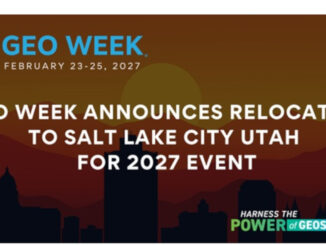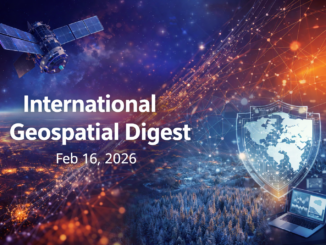
This editorial is in response to and in support of a recent article written by Kirsti Oja on the GoGeomatics Magazine, called Are You an Unemployed Geospatial Graduate in Canada? You’re Not Alone. While there is some truth to the difficulty of young people finding employment, there are a few other issues to get off the table first. Kirsti does say that the “socials,” by their nature, do attract people looking for work. They do not represent a full cross-section. How many of the hundreds of people employed in the geospatial sector in Ottawa come to the get-togethers? Not many, which is a pity – as one of the “old ones,” I find interacting with younger members of our profession to be energizing. (That is the end of the unpaid ad for GoGeomatics!) Keep in mind that there is networking, and then there is focused, intelligent, well-planned and effective networking. The rest of this response deals with what I think is, and is not, effective networking.
So, what advice might I give? First, I would suggest looking at my paper last year at IGARRS. While more directed at those doing graduate degrees, it is still relevant to those in college courses. Simply stated, do a project that means something to someone who might employ you! Setting up such a project also gives you an opportunity to speak to a variety of people in the field. Make use of that opportunity! If you are already out of school, then find an opportunity (or create one) to answer a question that someone thinks is important and do so as a volunteer. But do it on a topic where you have some passion. And if you don’t have any passion for the work, find something else to do where going to work every day does excite you.
Second, remember, you get but one chance to make a first impression. Keep in mind that the people who may employ you may not appreciate your style of dress, haircut, ink, or piercings. I know that it may not be relevant to how well you might do your job (I have heard that argument), but it will impact whether or not the prospective employer would want you representing his or her company at a conference or client site, for example. At the same time, if you are looking for a job as a technician, you may not want to appear in a dark blue suit with regimental tie and $400 wing-tipped shoes!
Third, relevant job experience is not just working with geospatial information. All sorts of background and employment can be relevant. You speak another language fluently? Say so – and when you do, note something about geospatial opportunities in a country that speaks that language. You were a waiter? Great – you can speak about customer service (and how you were promoted to be the person looking after the night deposit…or whatever else showed an employer’s confidence in you)! You were a labourer digging ditches? You demonstrated the ability to work in a difficult environment – and never missed a day, six days a week, ten hours a day, rain or shine for three summers – or whatever. My four children (ages 29-37) managed to find work every summer and each one eventually parlayed their summer employment over the years into a well-paying profession. They worked hard. They volunteered. They asked for advice. They saw role models and tried to learn from them. Now they are role models.
Fourth, focus. Successful people focus on delivering value and building up outstanding references. Most students don’t focus as clearly as they might or should. Focus is an important part of the answer to finding employment.
Fifth, you must either REALLY understand all things geospatial or have a strong background in some other relevant discipline – many of today’s geospatial specialists don’t have a home discipline or area of expertise such as biology, forestry, or agriculture. My youngest son has courses in GIS and such, but he did them all in a faculty of forestry. He is first a forester, secondly a geospatial person. He has expertise outside of geospatial, but could work in the geospatial field if he so wished. If you want to better understand the geospatial field and what you can bring to the table, you might want to read our book Why ‘Where’ Matters. It may be getting old, but it is still as relevant today as when it was written.
Sixth, people who don’t really want jobs don’t have them. It really does seem like there are those who don’t want a job. I have met several unemployed younger people at the socials. One of them gave me a business card with an incorrect e-mail address on it; that didn’t impress me. I eventually called her, left a message, and she never responded. And she wants a job? Fat chance! Another asked for advice and never followed up when I responded. Yet another spent a great deal of time speaking very loudly about how much he knew about remote sensing and how little most other people knew. When I questioned one of his statements he actually said, “Well, if you really knew anything about remote sensing you would know that…” I didn’t have the heart to tell him my background. All of these people may have the credentials, but no clue as to what networking to find work really is all about. I would not hire any of them.
Seventh, another “killer” is the CV with spelling or grammatical errors, or one prepared for company “x” and given to company “y.” (I really have seen one saying that “J. Smith would make an idea candidate for the position in Company X” when it was sent to my company Y.) Prepare your CV to focus on what the company you have in your sights does – not generic gibberish. Write it to draw attention in the first few sentences.
Eighth, what did the people who set themselves apart do to make an impact? They have all followed the CV advice. One young person contacted me after reading my book, told me of her interests in the environment and GIS, and asked if I would give her advice. She made an appointment to have coffee and asked questions that she had obviously prepared in advance – so as to not waste her time or mine. She was going to a mid-winter class at a college and was appropriately dressed. I was impressed and I introduced her to a friend who had her do a project overseas for her diploma. She finished her course and was hired by my friend. I last saw her in Asia, she has been working overseas. She subsequently helped a couple of her fellow students make contact with me for advice. They too are now employed. Another student asked for advice at a social and we had a brief conversation. She followed up with a thank-you note and has kept me informed as to her next planned steps to prepare for a career. Another met me at a GIS day where she was networking with the people there. We briefly chatted and I gave her some advice on courses and approach to summer jobs. Her CV and work experience were not on geospatial, but it was strong and was nicely related to geospatial. Some months later she asked for advice on which job she should take. Another knew a friend of mine who worshipped at the same place and asked for an introduction. The fellow impressed me and we have been corresponding ever since – he is now in grad school in one of the places I suggested.
All of these people who got help seemed to be genuinely interested in the field: they knew something about it, and could explain why they were interested in it. They were all focused, well-prepared, and had a set of reasonable and intelligent questions that they did not repeat as if they had been memorized. They were polite and they did not “suck up” (or if they did, they did a superb job of it). They had well-prepared CVs showing how their sometimes mundane jobs provided a strong background for geospatial. They were appropriately dressed, and were confident enough to speak to me eye-to-eye, but still with respect.
Perhaps part of the message is to start thinking about working when you are a kid and develop good work habits early on. But even when you are 25 and unemployed, it may not be too late if you focus and network intelligently.






Be the first to comment